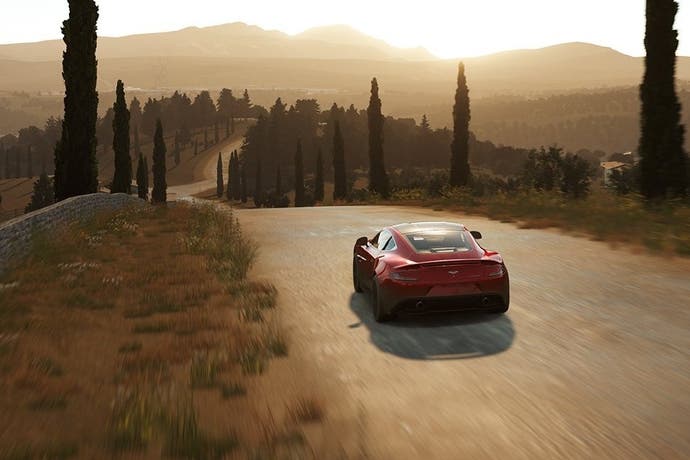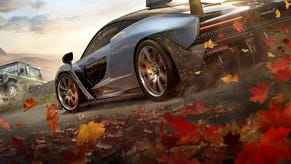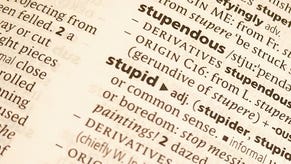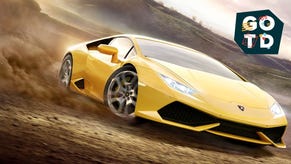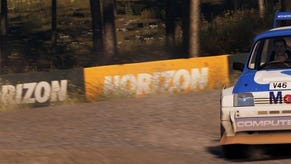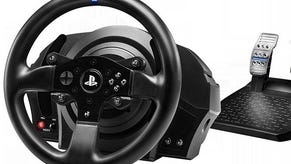Forza Horizon 2 review
Festival of speed.
It's a counterintuitive truth about the current, strange state of racing games that drier simulation racers have endured - games like Gran Turismo, its opposite number Forza Motorsport, and the thriving PC sim scene - while the appetite for more flashy, exciting and accessible games seems to have dried up. This year, even EA's mass-market stalwart Need for Speed will be missing its first Christmas since 2001. That's all very well for enthusiasts like me, but the genre as a whole is in danger of entrenchment and exclusion - of losing sight of something as simple and important as sheer entertainment value.
Enter Playground Games. The young UK studio is on a mission to break this sad entropy by building a bridge between hardcore and populist, between the car games you get and the car games you dream about, between rubber and soul. 2012's Forza Horizon, an open-word spin-off for the Xbox-exclusive sseries, was a supremely good start, and its sequel does not deviate from its course by one turn of the wheel. This is a game that lays claim to the spirits of such past greats as Project Gotham Racing and Test Drive and seizes them with aplomb.
That's big talk, but Forza Horizon 2 is the work of a studio humming with enthusiasm and professional confidence. It's no revolution: this is an iterative, by-the-book sequel to a game that was already very good. Forza Horizon fans might find it all pretty familiar, but then Forza Horizon fans are hardly likely to mind that. Newcomers, meanwhile, will be blown away by a supposedly serious racing game that dares to be this romantic and thrilling. (It's telling that our YouTube editor Ian, who normally doesn't get on with racing games at all, is smitten with Horizon 2.)
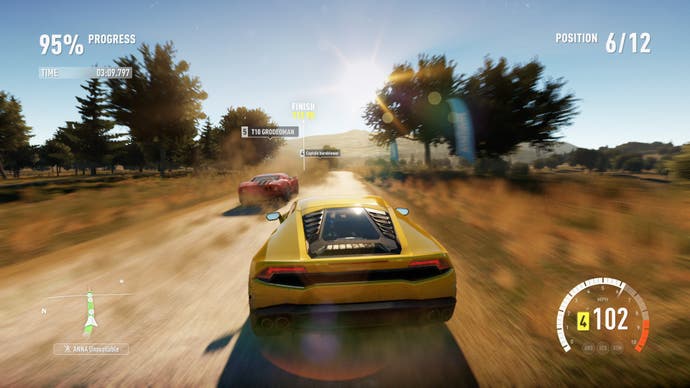
For the most part, Playground restricts itself to tuning and tinkering with its sound formula. That formula unleashes a judiciously pruned and embellished selection of the Forza car catalogue on the open road, using a gorgeous map based loosely on a real-world region for a setting, and the Horizon festival of music and racing for a context and a soundtrack.
The new setting - the southeastern corner of France and northwestern corner of Italy - isn't quite as grandiose or as varied as the first game's Colorado, but it's slightly more plausible for that. And it's just as beautiful and atmospheric, especially when sun goes down or the rain rolls in. Most importantly, the roads are wonderful. There's a stretch of winding coast road under cliffs that crosses the border - the archetypal Côte d'Azur cruise - that you will never tire of: drifting round the elegant bends, dancing between vans and superminis, drinking in the view, imagining you're in The Italian Job or To Catch a Thief. It's a holiday on a hard disk.
The delivery of the Horizon festival itself was rather forced in the first game, staging cheesy confrontations with preening rivals against a backdrop of sanitised, corporate youth culture (despite the authentically hip Rob da Bank-curated soundtrack). Horizon 2 wisely ditches much of that for a more restrained, European tack, retaining the fizz and thump of the radio stations and laser lightshows but paring back anything that keeps you off the road. Your friends - in the form of the "Drivatar" AIs that carry their Gamertags - make for much more motivating opposition than some cringingly underwritten stereotype.
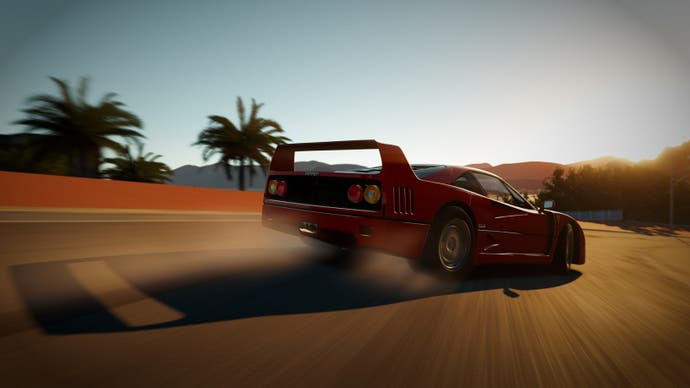
The structure is looser. Instead of moving up through banded championships, you now rotate through six hub locations, driving from one to the other in "road trips" - a cavalcade of exotic cars charging across the map alongside you - and selecting a competition of your choice at each. These race series are now arranged by type of car rather than performance level, and the categories - retro hot hatches, modern supercars, Group B rally cars, SUVs and so on - are curated with the eye of a true car enthusiast, encouraging you to explore and enjoy the full breadth of a brilliantly eclectic and charismatic car list. Amazingly, there is a series of appropriate courses for every one of the 28 categories in every location: 168 championships in all, although you need to win just 15 to unlock the grand finale.
Other changes? The Skill system - a scoring system not unlike Project Gotham's Kudos, which rewards you for drifting, drafting, smashing up scenery and generally driving with flair - has been given greater importance. Not only does it reward Skill Points which can be spent on perks in a simple skill tree, but also meaningful amounts of XP, which earns cash and car rewards and plays into various online scoring systems. It's still not the focused score-attack game of Gotham at its best, but it's a big improvement on the half-baked implementation of Skills in the first game, and maintaining Skill chains with high multipliers is an addictive bit of wire-walking. Elsewhere, the variable festival promo events have been scrapped in favour of more focused and flavourful Bucket List challenges - a high speed challenge in a hypercar, a coastal sprint in a valuable classic, stunt jumps in a vintage muscle car, that sort of thing.
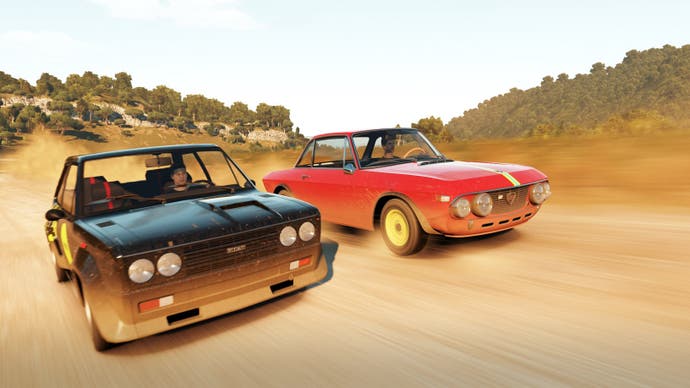
Horizon 2 has a few course-corrections to make on behalf of its sister series, too, after the misjudged Forza Motorsport 5. There isn't a single micro-transaction in the game - even the boosters from the first Horizon are gone - and in a series first, cars bought in download packs carry no credit cost in the in-game economy. In terms of the handling, meanwhile, the nervy snap oversteer that made Motorsport 5 such a handful has been tamed, leaving progressive and manageable drifting well suited to the high-speed, sweeping driving style (and those Skill chains). Although it introduces the detailed tuning options of the Motorsport games, it would be a stretch to call Horizon 2 a driving sim - steering is extremely quick, even on the "simulation" setting, and this is after all a game in which you can drive a Lamborghini across a field at over 100mph - but it has all the tactile physicality Forza is known for and manages a balance of realism, accessibility and thrills that bears comparison with Project Gotham Racing.
So far, so progressive. Where Horizon 2 does make big changes, though, it really makes them count.
The game allows off-road driving across a great majority of the map, opening up new areas to explore, new shortcuts to find and a new driving style. This would have been an inconsequential feature outside of multiplayer hijinks if it hadn't been so brilliantly exploited in a new style of event: Cross Country races. These pell-mell off-road dashes between checkpoints have you smashing through rows of crops, threading between trees, managing jumps and epic four-wheel drifts, above all finding and refining your own driving line. It's an exciting, attention-grabbing new racing discipline, and thanks to the excellent course design and the game's hefty physics engine, it's not without technical depth, either.
Horizon 2's biggest improvement, though, comes when you take the game online. Horizon's multiplayer was an undercooked assemblage of race playlists, throwaway games of automotive tag and a rather aimless Free Roam mode. It didn't make the most of the game's great asset - that huge, beautiful map. Horizon 2 fixes that with a much improved, instant-launch Free Roam that allows access to every course in the game (as well as co-op versions of the Bucket List events and more). It also replaces the perfunctory playlists with the brilliant Road Trip mode.
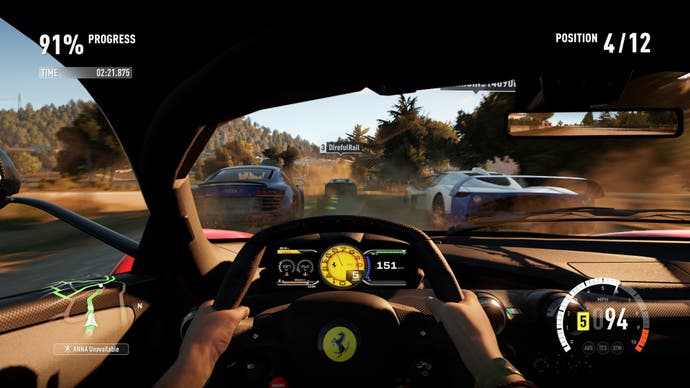
A game of Road Trip strings together a selection of four events - usually a mix of race types with a game of tag or two - and has the party drive from one to the next across the map, risking shortcuts and Skill chains as they go because the leaderboard is not based on points but total XP earned, including between races. It's competitive yet relaxed and funny stuff and it uses the game's tremendous assets - the map, the day-night and weather cycles, the huge variety of the garage - to the full. The Forza series' lively sense of community is given other outlets too: Car Meets, where you can admire and download other players' car tunes and paint jobs as well as challenge them to sprints and drag races, and Car Clubs which compete both within and among themselves on XP-based leaderboards.
All in all, it's a new, friendly context for multiplayer racing that's in total harmony with the solo game's adventurous, celebratory tone. In the original Horizon, as terrific as it was, the festival theme felt like a marketing hook first and a clever game structure second. In Forza Horizon 2, it's more like a philosophy, an outlook, a mood that has seeped right through to the core of the game and infused the whole thing with a pure, escapist joy.
It's going to be a busy season for racing games, with sim hopeful Project Cars, ambitious online "CarPG" The Crew and the social score-attack of DriveClub all jostling for attention. Horizon 2 sets an intimidatingly high bar for those games to meet on every front, but in one aspect it seems unbeatable. I can't imagine any of them are going to feel this happy.
